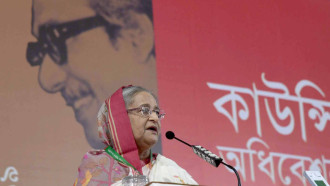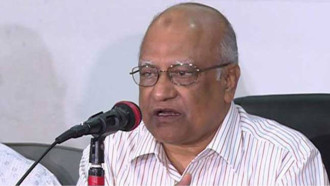Salauddin’s family going to meet president

Dhaka: The death-row war crimes convict Bangladesh Nationalist Party leader Salauddin Quader Chowdhury’s family members are going to Bangabhaban, Bangladesh president residence.
The death-row war crimes convicts Salauddin Quader Chowdhury and Bangladesh Jamaat-e-Islami leader Ali Ahsan Mohammad Mojaheed filed written application to president seeking his clemency, the jail authorities told media at a press briefing on Saturday.
Mojaheed, 67, is the second most senior member of Bangladesh Jamaat-e-Islami, while Salauddin, 66, is an ex-lawmaker and a top leader of the main opposition Bangladesh Nationalist Party.
Earlier on 19 November, the SC released the full text of the verdicts after the four judges — Chief Justice Surendra Kumar Sinha, Justice Nazmun Ara Sultana, Justice Syed Mahmud Hossain and Justice Hasan Foyez Siddique — of the Appellate Division bench signed those turning down the review petitions against its earlier orders upholding their death sentences for committing crimes against humanity during the Liberation War in 1971.
On Wednesday, the SC upheld its previous verdicts on Ali Ahsan Mohammad Mojaheed and BNP leader Salauddin Quader Chowdhury, rejecting their pleas for reviewing death penalties for their war crimes.
A four-member bench of the Appellate Division, headed by Chief Justice Surendra Kumar Sinha, dismissed the review petitions of the duo.
On 14 October, Mojaheed and SQ Chowdhury filed the review petitions with the SC against its verdicts that upheld their death penalties for their crimes against humanity during the 1971 war.
On 1 October, the International Crimes Tribunal had issued death warrants against them.
The SC on 30 September released the full verdicts awarding death penalties to them for their crimes against humanity during the war, clearing the way for the execution of the judgment.
The court on 16 June upheld the death sentence awarded by the ICT-2 to Mojaheed for killing intellectuals during the war.
The International Crimes Tribunal-2 on 17 July 2013 awarded Ali Ahsan Mohammad Mojaheed death penalty for committing crimes against humanity during the Liberation War in collaboration with the Pakistan occupation forces, after finding the Al Badr boss guilty of five charges, out of seven.
On 11 August 2013, condemned convict Mojaheed filed an appeal with the Appellate Division against his capital punishment awarded by the ICT-2.
Mojaheed was arrested on charge of hurting religious sentiment on 29 June 2010 and later he was shown arrested in a case filed for committing crimes against humanity on 2 August that year.
Earlier, the court on 29 June upheld the death sentence awarded by ICT-1 to him for committing crimes against humanity, including rape and mass killing, during the Liberation War, 43 years ago.
On 1 October 2013, the then International Crimes Tribunal-1 found Salauddin Quader Chowdhury guilty of crimes against humanity during the War of Liberation and condemned him to death.
On 29 October of the same year, Salauddin Quader Chowdhury filed an appeal with the Appellate Division of the Supreme Court against the ICT verdict.

 NTV Online
NTV Online




